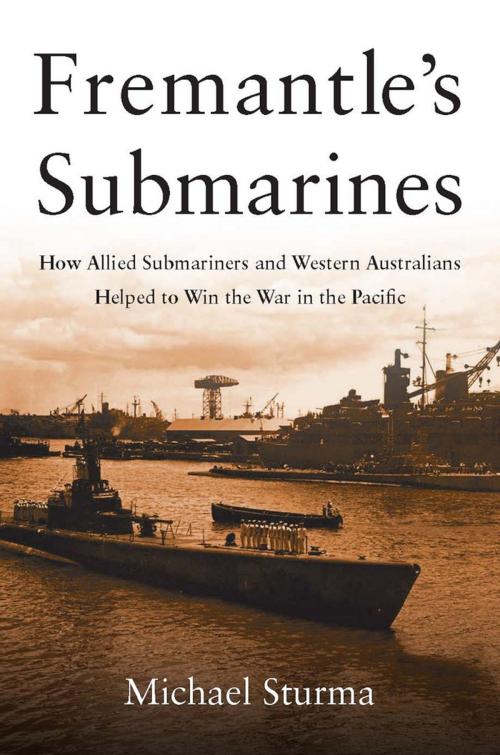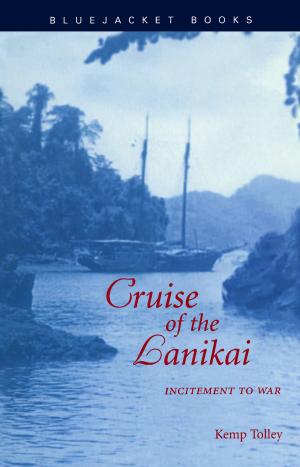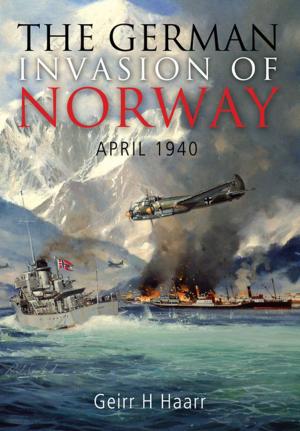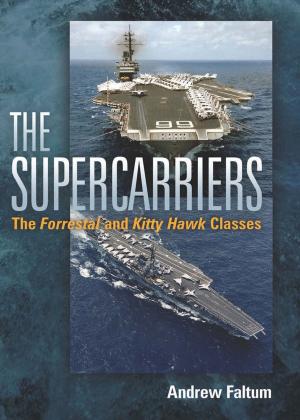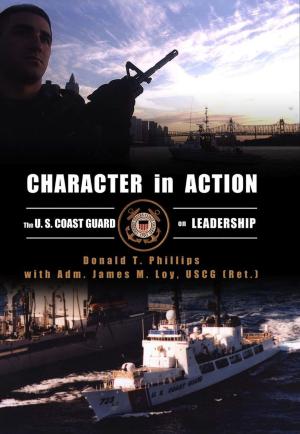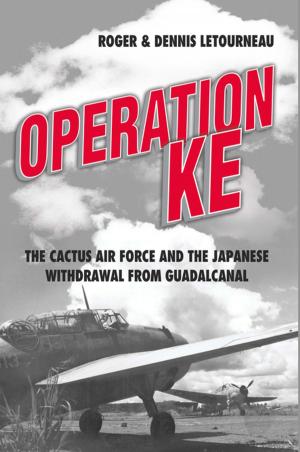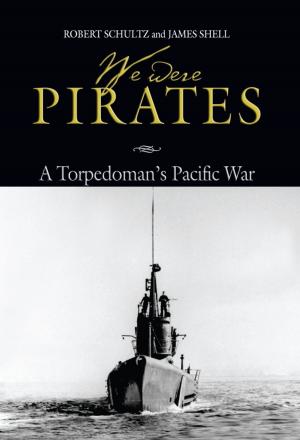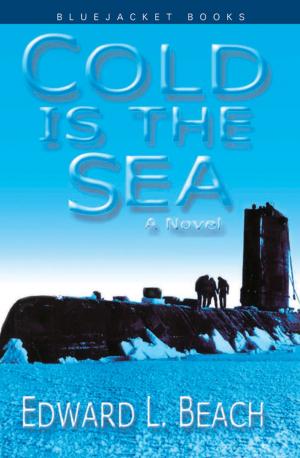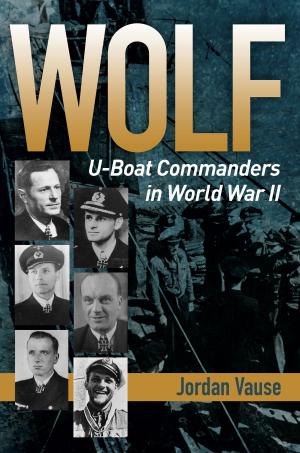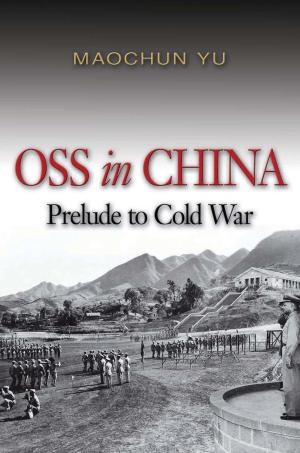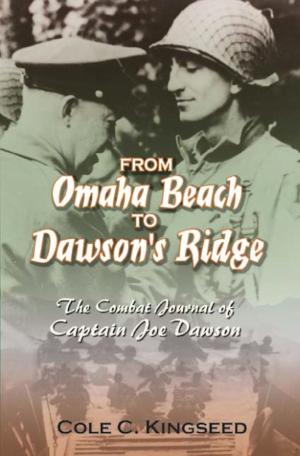Fremantle's Submarines
How Allied Submariners and Western Australians Helped Win the War in the Pacific
Nonfiction, History, Military, World War II| Author: | Michael Sturma | ISBN: | 9781612518619 |
| Publisher: | Naval Institute Press | Publication: | September 15, 2015 |
| Imprint: | Naval Institute Press | Language: | English |
| Author: | Michael Sturma |
| ISBN: | 9781612518619 |
| Publisher: | Naval Institute Press |
| Publication: | September 15, 2015 |
| Imprint: | Naval Institute Press |
| Language: | English |
From unpromising beginnings in March 1942, the submarine base at Fremantle became a vital part of the Allied offensive against Japan. Pushed back from the Philippines and the Netherlands East Indies, American submariners, accompanied by small numbers of Dutch, retreated to Fremantle on the remote west coast of Australia as a port of last resort. Far from their prospective patrol areas and their own supply lines, they had little reason to feel optimistic. Thanks largely to a welcoming civilian population, the morale of Allied submariners quickly improved, as did their effectiveness in fighting the enemy.
The first arrival of American and Dutch submarines at Fremantle coincided with a period when Western Australians felt especially vulnerable. On 3 March Japanese Zero fighters bombed the towns of Wyndham and Broome, while the same day there were three Japanese submarine attacks on shipping off the Western Australian coast. With many locals convinced that a Japanese invasion was imminent, Allied submariners got an appreciative reception. While in relatively small numbers, submariners were widely perceived as an elite force not only within the navy, but more generally by those who admired their courage and commitment. Although the Australians had no submariners of their own, they supported the base through the mobilization of resources and labor. Joined by British submariners from 1944, Allied submarines made a total of 416 patrols from Fremantle during the course of the war, becoming the most active base in the Pacific after Pearl Harbor. Some of the most famous submarines of the Second World War including USS Harder, USS Flasher and HMS Trenchant operated out of Fremantle, and many of the submariners who sailed from that port made the ultimate sacrifice.
The success of Fremantle’s submarines depended not only on personal heroism, but cooperation between allies. From disastrous beginnings, the Allies overcame inertia and national suspicions to become a much more effective fighting force than their enemies. The Australian government provided unstinting support, while Australian commandos shared the perils of many submarine patrols. Meanwhile cooperation between American, Dutch and British submariners pioneered joint naval operations in the Pacific.
This book documents not only the courage of submarine crews and the multinational cooperation that developed between Allies, but integrates the experiences of submariners on shore with their operations at sea. The promise of leave in Australia made the hardships and perils of lengthy war patrols more bearable. News that a submarine was ending its patrol in Fremantle inevitably created an expectant excitement among the crew on board. The hospitality and sense of belonging fostered by Western Australians became legendary among Allied submariners and remains central to their wartime memories. Many of those memories focus on relationships with young women, frequently sealed permanently through marriages. Many submariners also remember fondly the high alcohol content of Australian beer. Most of all, however, they recall the generosity of those civilians who welcomed them into their homes and hearts. At the same time, visiting submariners helped fill the emotional void created in many Australian families by absent sons, brothers, fathers and husbands fighting overseas. In an atmosphere of wartime austerity and rationing, the submariners also proved generous in sharing scarce resources with the local population. From the standpoint of morale, Fremantle became one of the most successful military outposts of the Second World War.
The first arrival of American and Dutch submarines at Fremantle coincided with a period when Western Australians felt especially vulnerable. On 3 March Japanese Zero fighters bombed the towns of Wyndham and Broome, while the same day there were three Japanese submarine attacks on shipping off the Western Australian coast. With many locals convinced that a Japanese invasion was imminent, Allied submariners got an appreciative reception. While in relatively small numbers, submariners were widely perceived as an elite force not only within the navy, but more generally by those who admired their courage and commitment. Although the Australians had no submariners of their own, they supported the base through the mobilization of resources and labor. Joined by British submariners from 1944, Allied submarines made a total of 416 patrols from Fremantle during the course of the war, becoming the most active base in the Pacific after Pearl Harbor. Some of the most famous submarines of the Second World War including USS Harder, USS Flasher and HMS Trenchant operated out of Fremantle, and many of the submariners who sailed from that port made the ultimate sacrifice.
The success of Fremantle’s submarines depended not only on personal heroism, but cooperation between allies. From disastrous beginnings, the Allies overcame inertia and national suspicions to become a much more effective fighting force than their enemies. The Australian government provided unstinting support, while Australian commandos shared the perils of many submarine patrols. Meanwhile cooperation between American, Dutch and British submariners pioneered joint naval operations in the Pacific.
This book documents not only the courage of submarine crews and the multinational cooperation that developed between Allies, but integrates the experiences of submariners on shore with their operations at sea. The promise of leave in Australia made the hardships and perils of lengthy war patrols more bearable. News that a submarine was ending its patrol in Fremantle inevitably created an expectant excitement among the crew on board. The hospitality and sense of belonging fostered by Western Australians became legendary among Allied submariners and remains central to their wartime memories. Many of those memories focus on relationships with young women, frequently sealed permanently through marriages. Many submariners also remember fondly the high alcohol content of Australian beer. Most of all, however, they recall the generosity of those civilians who welcomed them into their homes and hearts. At the same time, visiting submariners helped fill the emotional void created in many Australian families by absent sons, brothers, fathers and husbands fighting overseas. In an atmosphere of wartime austerity and rationing, the submariners also proved generous in sharing scarce resources with the local population. From the standpoint of morale, Fremantle became one of the most successful military outposts of the Second World War.
From unpromising beginnings in March 1942, the submarine base at Fremantle became a vital part of the Allied offensive against Japan. Pushed back from the Philippines and the Netherlands East Indies, American submariners, accompanied by small numbers of Dutch, retreated to Fremantle on the remote west coast of Australia as a port of last resort. Far from their prospective patrol areas and their own supply lines, they had little reason to feel optimistic. Thanks largely to a welcoming civilian population, the morale of Allied submariners quickly improved, as did their effectiveness in fighting the enemy.
The first arrival of American and Dutch submarines at Fremantle coincided with a period when Western Australians felt especially vulnerable. On 3 March Japanese Zero fighters bombed the towns of Wyndham and Broome, while the same day there were three Japanese submarine attacks on shipping off the Western Australian coast. With many locals convinced that a Japanese invasion was imminent, Allied submariners got an appreciative reception. While in relatively small numbers, submariners were widely perceived as an elite force not only within the navy, but more generally by those who admired their courage and commitment. Although the Australians had no submariners of their own, they supported the base through the mobilization of resources and labor. Joined by British submariners from 1944, Allied submarines made a total of 416 patrols from Fremantle during the course of the war, becoming the most active base in the Pacific after Pearl Harbor. Some of the most famous submarines of the Second World War including USS Harder, USS Flasher and HMS Trenchant operated out of Fremantle, and many of the submariners who sailed from that port made the ultimate sacrifice.
The success of Fremantle’s submarines depended not only on personal heroism, but cooperation between allies. From disastrous beginnings, the Allies overcame inertia and national suspicions to become a much more effective fighting force than their enemies. The Australian government provided unstinting support, while Australian commandos shared the perils of many submarine patrols. Meanwhile cooperation between American, Dutch and British submariners pioneered joint naval operations in the Pacific.
This book documents not only the courage of submarine crews and the multinational cooperation that developed between Allies, but integrates the experiences of submariners on shore with their operations at sea. The promise of leave in Australia made the hardships and perils of lengthy war patrols more bearable. News that a submarine was ending its patrol in Fremantle inevitably created an expectant excitement among the crew on board. The hospitality and sense of belonging fostered by Western Australians became legendary among Allied submariners and remains central to their wartime memories. Many of those memories focus on relationships with young women, frequently sealed permanently through marriages. Many submariners also remember fondly the high alcohol content of Australian beer. Most of all, however, they recall the generosity of those civilians who welcomed them into their homes and hearts. At the same time, visiting submariners helped fill the emotional void created in many Australian families by absent sons, brothers, fathers and husbands fighting overseas. In an atmosphere of wartime austerity and rationing, the submariners also proved generous in sharing scarce resources with the local population. From the standpoint of morale, Fremantle became one of the most successful military outposts of the Second World War.
The first arrival of American and Dutch submarines at Fremantle coincided with a period when Western Australians felt especially vulnerable. On 3 March Japanese Zero fighters bombed the towns of Wyndham and Broome, while the same day there were three Japanese submarine attacks on shipping off the Western Australian coast. With many locals convinced that a Japanese invasion was imminent, Allied submariners got an appreciative reception. While in relatively small numbers, submariners were widely perceived as an elite force not only within the navy, but more generally by those who admired their courage and commitment. Although the Australians had no submariners of their own, they supported the base through the mobilization of resources and labor. Joined by British submariners from 1944, Allied submarines made a total of 416 patrols from Fremantle during the course of the war, becoming the most active base in the Pacific after Pearl Harbor. Some of the most famous submarines of the Second World War including USS Harder, USS Flasher and HMS Trenchant operated out of Fremantle, and many of the submariners who sailed from that port made the ultimate sacrifice.
The success of Fremantle’s submarines depended not only on personal heroism, but cooperation between allies. From disastrous beginnings, the Allies overcame inertia and national suspicions to become a much more effective fighting force than their enemies. The Australian government provided unstinting support, while Australian commandos shared the perils of many submarine patrols. Meanwhile cooperation between American, Dutch and British submariners pioneered joint naval operations in the Pacific.
This book documents not only the courage of submarine crews and the multinational cooperation that developed between Allies, but integrates the experiences of submariners on shore with their operations at sea. The promise of leave in Australia made the hardships and perils of lengthy war patrols more bearable. News that a submarine was ending its patrol in Fremantle inevitably created an expectant excitement among the crew on board. The hospitality and sense of belonging fostered by Western Australians became legendary among Allied submariners and remains central to their wartime memories. Many of those memories focus on relationships with young women, frequently sealed permanently through marriages. Many submariners also remember fondly the high alcohol content of Australian beer. Most of all, however, they recall the generosity of those civilians who welcomed them into their homes and hearts. At the same time, visiting submariners helped fill the emotional void created in many Australian families by absent sons, brothers, fathers and husbands fighting overseas. In an atmosphere of wartime austerity and rationing, the submariners also proved generous in sharing scarce resources with the local population. From the standpoint of morale, Fremantle became one of the most successful military outposts of the Second World War.
